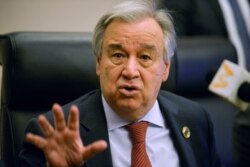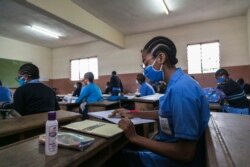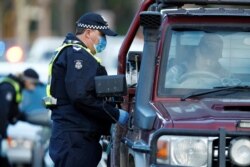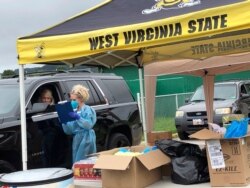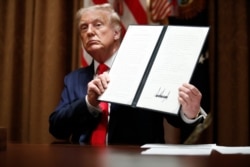United Nations Secretary-General Antonio Guterres says with schools being forced to shut their doors because of the coronavirus pandemic, the world is facing a “generational catastrophe.”
Guterres made the comments Tuesday during a video briefing to launch a new U.N. campaign dubbed “Save Our Future,” aimed at restoring and bolstering formal education in a post-pandemic world.
The head of the world body said that as of mid-July, more than 1 billion children in at least 160 countries are missing out on formal studies, while at least 40 million children have missed out on pre-school. Guterres said disabled students, members of minority or disadvantaged communities, as well as refugees and displaced persons, are among those at highest risk of being left behind.
The secretary-general noted the world was already in a “learning crisis” before the pandemic, with 250 million children worldwide out of school.
“Now we face a generational catastrophe that could waste untold human potential, undermine decades of progress, and exacerbate entrenched inequalities,” he said.
Guterres said getting students back in classrooms “must be a top priority” once the COVID-19 outbreak has been brought under control. He also called for greater investment in education, with low- and middle-income countries facing an annual funding gap of $1.5 trillion prior to the pandemic, including investments in “digital literacy and infrastructure.”
The U.N. chief also said education initiatives must be geared towards those at greatest risk of being left behind.
With the number of confirmed cases around the world, according to the Johns Hopkins Coronavirus Resource Center, now past 18.2 million — and the number of deaths nearing the 700,000 mark — the director of the World Health Organization has warned there may never be a “silver bullet” for stopping the spread of the coronavirus.
WHO Director-General Dr. Tedros Adhanom told reporters Monday that while a number of vaccines are now in late-stage trials, all countries and individuals should employ a “do it all” strategy — listing testing, contact tracing, social distancing and wearing masks — as some of the necessary things that must continue to be done to stop the spread of the virus.
Australia is ordering nonessential businesses in Melbourne, its second-largest city, to close for six weeks starting Wednesday, as authorities try to control an outbreak that accounts for nearly all of the country’s new cases.
Health officials reported 429 new infections and 13 deaths Monday in Victoria state, which includes Melbourne. Victoria state Premier Daniel Andrews declared Melbourne a COVID-19 disaster on Sunday.
In addition to closing most stores, other industries such as construction and meat production will have to limit their operations starting Friday.
Victoria state Premier Daniel Andrews said Tuesday that an additional 500 military personnel will be deployed to the state this week to help local authorities enforce the new stay-at-home orders, including a strict dusk-to-dawn curfew.
Andrews also said anyone caught violating the orders will face more than $3,500 in fines.
Australian Prime Minister Scott Morrison said Monday that workers in Victoria who do not have paid sick leave and have to isolate themselves will be eligible to receive a payment of about $1,000.
In the United States, which has about one-fourth of the world’s confirmed coronavirus cases, negotiations between the White House and congressional Democrats failed again on Monday to reach agreement on a new aid package that would include federal money to help the millions of people who are unemployed.
Many Americans have lost their jobs during the pandemic, due to lockdown restrictions and new consumer habits that have badly hurt the economy. A previous round of federal aid that provided $600 a week to the unemployed expired last week.
The talks come as the United States deals with an ongoing surge in cases that began in June and pushed leaders in some states to reinstate some of the restrictions they had lifted in hopes that economic activity could return without a resurgence of the virus.
U.S. President Donald Trump told reporters Monday a "permanent lockdown" policy is not a "viable path forward" in combating the coronavirus pandemic. He noted that other countries have seen a resurgence in cases after lockdowns.
The president lashed out earlier Monday at Dr. Deborah Birx, the White House’s coronavirus response coordinator, who said the U.S. had entered a “new phase” of the pandemic during an interview the day before on the U.S. cable news network, CNN. Trump said Dr. Birx’s comments that the coronavirus is spreading uncontrollably were meant to appease House Speaker Nancy Pelosi, who has criticized the administration’s handling of the crisis. The president tweeted that Birx “took the bait” and called her “pathetic.”
Dr. Anthony Fauci, the nation’s top infectious-disease expert and a member of the administration’s coronavirus task force along with Birx, backed her observation Monday.
Fauci said Birx was referring to “community spread,” meaning the virus is spreading randomly instead of being concentrated in one spot.
“When you have community spread, it’s much more difficult to get your arms around that and contain it,” Dr. Fauci said.
Richard Green, Megan Duzor, Chris Hannas contributed to this report.





